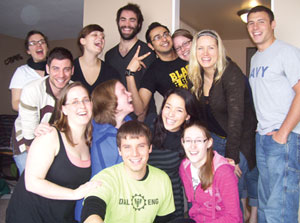 |
| Front: Heather MacKenzie, Beth Stevens, Richard Plourde, Emily Stewart, Heather Semotiuk. Back: Laura Payne, Angelo Di Quinzio, Erin Dwyer, Spencer Fowlie, Ahmed Shouman, Danielle MacDonald, Meghan Swanburg, Ryan Brookman. |
тАЬPretty excited,тАЭ is how Richard Plourde, president of the ║┌┴╧│╘╣╧═Їchapter of Engineers Without Borders (EWB) describes his reaction to finding out his group had won the $2,500 prize in the ║┌┴╧│╘╣╧═ЇStudent UnionтАЩs Social Innovation Challenge.
The months-long process culminated in an intense DragonтАЩs Den-style Q&A in front of a panel of experts and students at the recent Brains for Change conference last month.┬аAfter presenting its proposal to expand its youth outreach program, the project was voted as the winning submission.
тАЬThe best thing is that weтАЩll have the opportunity to invest back into the community and student body, and have a greater impact,тАЭ says Mr. Plourde of their win.
EWB volunteers have been involved in classroom outreach programs for a while, but this fall, with the help of their winnings from the challenge, they are planning to expand their reach further. They will facilitate sessions in junior high and high schools on water and food security, root causes of poverty and other development-related issues.
What makes EWB unique is its use of fun activities and workshops that aim to help youth experience the issues instead of a lecture-based format. For instance, youth are encouraged to play the part of countries around the world while trying to complete a task, to help them understand the many difficulties that people in developing nations face from day to day.
тАЬItтАЩs really neat to see kids have their first тАШahaтАЩ moment,тАЭ says Emily Stewart, a third-year science student who has been a volunteer with EWB for three years. тАЬWe thought about how when we were kids, there was a big push in schools to reduce, reuse recycle, and it created this generation of kids who had that idea ingrained in them. WeтАЩre hoping to have the same social change.тАЭ
тАЬWe think of the project as an investment,тАЭ agrees Mr. Plourde, a fourth-year environmental engineering major.
The money from the Social Innovation Challenge will go towards the purchase of materials to implement the workshops, cover transportation costs for volunteers and follow up on projects initiated by the students taking part in the workshops.
EWB volunteers hope to see the issues raised by their initiative eventually integrated into the provincial curriculum, and think itтАЩs important that international development issues are raised with youth early on.
тАЬWe want to show them that a really simple action can have a huge impact in the end,тАЭ says Mr. Plourde. тАЬThey just need to get into action, educate themselves about the concept, and be critical about whatтАЩs being said and done.тАЭ
EWB is planning to implement their full strategy in September 2010, and meet every second Thursday at 6:30 p.m. If you would like to get in touch with them regarding volunteer opportunities, contact Richard Plourde at dal@ewb.ca . To learn more about what EWB does in Canada and around the world you can also visit their national website at
